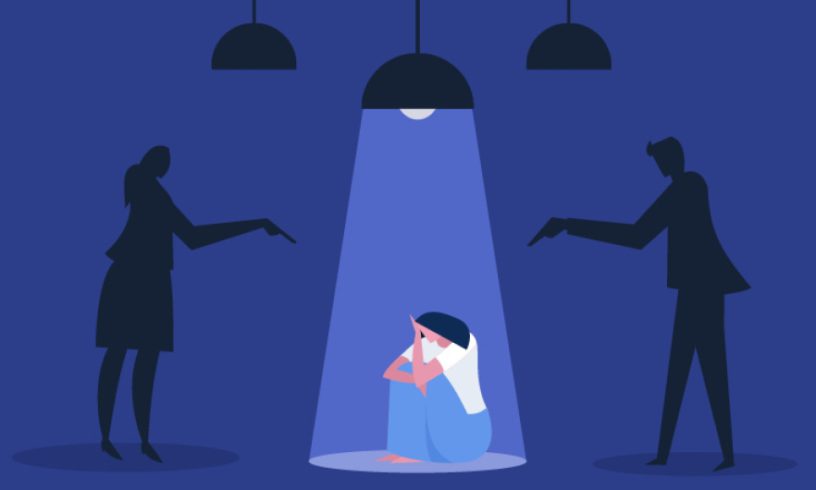
At its core, stigma is the sense – whether conscious or unconscious – that someone is different than you and that difference is negative.
Stigma separates “us” from “them.”
Neurodiversity is a viewpoint that brain differences are normal, rather than deficits. Neurodivergent people experience, interact with and interpret the world in unique ways. This concept can help reduce the stigma around learning and thinking differences.
Stigma is not unique to mental health issues. It was the same case with TB, Leprosy, and more recently Covid.
Common public stigmas:
- People with mental health disorders are weak or lazy:
- This may occur when someone thinks, “I’ve struggled with similar issues and turned out fine, so people with mental health disorders need to take more responsibility,” or, “I had the same issues, but I’ve never used a mental health disorder as an excuse to miss school, practice, chores or my job.”
- People with mental health disorders are prone to violence:
- An example of this is when statements are made about tragedies or acts of violence such as school shootings, such as, “Only a crazy or mentally ill person would do something like this.” This often categorizes hatred as a mental health disorder, which it is not.
- People with mental health disorders are incompetent:
- This stigma might show through thoughts like, “I’m not sure we should hire someone so open about their history of depression,” or, “My child suffers from social anxiety and needs me to always be there for him/her.”
The public stigma surrounding mental health can lead to self-stigma and decreased help-seeking. Examples of thoughts guided by self-stigma include:
- “I need to see a therapist, but if my friends/peers find out I leave class to see a therapist they will make fun of me. I’ll get through this on my own.”
- “I’ve always felt anxious and depressed, and I’ll always feel like this.”
- “I must be going crazy. No one else is going through this.”
These perceptions about mental health disorders and people diagnosed with a disorder are wrong.
“Research and experience dispel each of these stigmas time and time again,” says Dr. Westers. “For example, we know treatment can be very effective so that a mental health disorder isn’t always something a person struggles with the rest of their life, and we know that individuals diagnosed with mental health disorders are no more likely to commit acts of violence than those without a mental health disorder.”
Dr. Westers says it’s important to know that many people with a mental health disorder go on to be thriving, successful, and an important part of our society.
1. Educate yourself and your children about mental health
The first step in reducing mental health stigma is providing accurate information about mental health disorders. This can include sharing straightforward facts about disorders, like the symptoms of depression or anxiety.
Education can also include using correct terminology. When speaking about a mental health disorder, separate the person from their diagnosis. “We don’t call people bipolar. Instead, we say a person has a bipolar disorder,” explains Dr. Westers. “This simple shift demonstrates that a person is so much more than a diagnosis.”
Parents can also dispel myths about mental health to provide important education:
- Mental health disorders are treatable. When parents frame mental health disorders as treatable conditions, children can start to feel more hopeful about seeking treatment.
- Mental health is part of your overall health. Children know they need to see a doctor when they have an illness or injury. The same is true when they struggle with a mental health issue. Talking about mental health as part of their overall health helps remove any shame or embarrassment.
2. Give context around mental health disorders
When children see or hear others – whether it’s someone famous or someone in their social circle – talk openly and honestly about mental health, it gives them a better context for the topic.
“One dangerous thing about mental health stigma is it creates an ‘us’ versus ‘them’ situation,” Dr. Westers says. “But, when a child, teen, or adult, realizes someone they know or admire struggles with a mental health disorder, it starts to knock down some of those lines and decreases shame. Celebrities like Michael Phelps and Kristen Bell have helped shine a spotlight on mental health. Kids now see someone who struggled with depression, anxiety, or suicidal thoughts and got help. It’s a much more positive, hopeful, and accurate depiction than what stigma presents.”
3. Explain mental health as a continuum
When you talk about mental health as a continuum, or as a range, it helps others identify with those diagnosed with a mental health condition.
“Everyone feels sad from time to time – sometimes more than at other times. And sometimes, those feelings are so intense, you can’t get out of bed, can’t eat,” says Dr. Westers. “Explaining something like depression on a continuum helps children see that people with depression aren’t that different from them. It highlights how we are alike instead of how we are different.”
4. Show solidarity with others
Showing solidarity with someone diagnosed with a mental health disorder is the next step in removing stigma. It takes us one step closer to demonstrating sympathy and showcasing empathy.
Showing solidarity means not telling people “they’re fine” when depressed or that they “just need to cheer up” or “get over it.” It’s about taking the time to listen and support without judgment. It’s offering to walk your friend to the school counselor to get them the help they need. It’s saying, “I stand with you,” and then following it up with your actions.
5. Share messages of recovery
Messages of recovery are among the strongest and most hopeful tools for removing stigma.
“We’re changed by stories and by people we can relate to,” explains Dr. Westers. “Parents should feel empowered and encouraged to share how they, a family member or close friend, overcame a mental health condition. Their children do not need to know all the details, but stories take away the negative perceptions and show that anyone can experience a mental health disorder and – most importantly – can learn to manage it and even recover.”







Leave a Reply